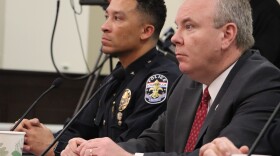It’s been more than 25 years since 18-year-old Jessica Currin was found dead and burned behind a Mayfield middle school, but the case isn’t closed in Graves County.
Quincy Cross has been in prison since 2008 for her murder, a crime he maintains he didn’t commit.
Attorneys with the Kentucky Innocence Project (KIP) and the Exoneration Project argued on behalf of Cross in an evidentiary hearing Tuesday and Wednesday at the Graves County Temporary Court Facility as part of a process his legal team hopes will end in his release from prison and a new trial.
Cross’s case and his hopes for exoneration have gained more notoriety in recent months with the release of a new podcast from an award-winning journalist and producer dedicated to telling the story of Currin’s murder, its investigation and litigation.
Special Judge Tyler Gill granted the evidentiary hearing following an October court date, limiting Cross’s defense team to recanted statements and affidavits from multiple key witnesses in the case.
During this week’s proceedings, a number of witnesses were called by Cross’s attorneys and the state, but there’s still more to go. The hearing is set to resume in mid-December.
Both the state and Cross’s legal team say that on the night Currin was last seen alive, the young Black mother played cards at Latoya Senter’s with Vinisha Stubblefield and another friend.
In the version of events laid out by prosecutors in 2008, Currin walked towards her home after the night concluded and was picked up by a car containing Cross, Stubblefield, Tamara Caldwell, Victoria Caldwell and Jeffrey Burton. From there, testimony at that time from multiple witnesses painted a lurid picture of Currin being taken to Burton’s house, where prosecutors at Cross’s original trial say he allegedly sexually assaulted and strangled Currin to death before he made the others touch her corpse in a sexual manner. Her body was found days later, burned behind Mayfield Middle School.
Over the first two days of the evidentiary hearing, multiple witnesses disputed that version of events.
First day of hearing
Tuesday, the first day of proceedings, focused entirely on the testimony of Vinisha Stubblefield – the last known person to see Currin alive and one of the prosecution's main witnesses in 2008.
Stubblefield herself pleaded guilty in 2008 to multiple charges related to Currin’s death, including abuse of a corpse and tampering with evidence.
Much of the day was spent in retreading Stubblefield’s 2008 testimony, her questioning by authorities in the runup to that trial and statements and interviews she had given in the years since she was on the witness stand.
Stubblefield, who said she suffers from multiple mental health and intellectual processing disorders including ADHD, manic bipolar disorder and a comprehension disorder, among others, was repeatedly questioned by Cross’s attorneys and the state prosecution regarding her memories of the events surrounding Currin’s death and the subsequent investigation.
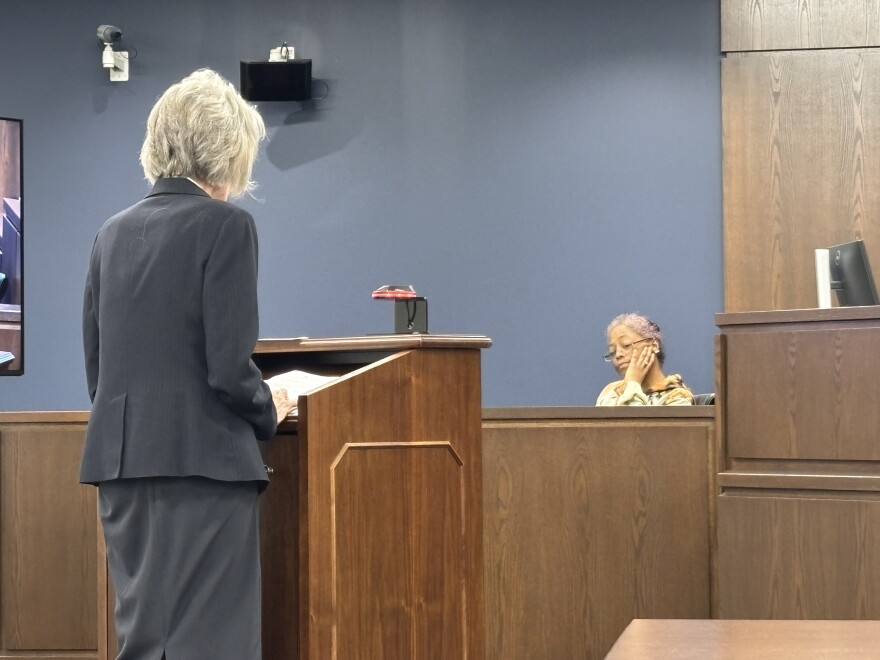
Stubblefield claims she was repeatedly threatened by members of law enforcement to lie under oath and “coached” on how to testify during the 2008 trial that sent Cross to prison. She specifically identified Lee Wise and Robert O'Neil, a pair of agents who worked for the Kentucky Bureau of Investigation (which now operates as the Department of Criminal Investigations under the state Attorney General’s office), as well as former Kentucky State Police officer Michelle Kent.
She signed an affidavit in 2023 declaring that she did not leave Senter’s house on the night Currin was believed to have been killed.
On Tuesday, she repeatedly failed to remember instances of past testimony and other events surrounding the case. Throughout, she maintained both her and Cross’s innocence, claiming that she felt she had no choice in 2008 but to take the plea deal that implicated her in Currin's murder.
The state’s prosecution team questioned Stubblefield’s ability to remember many details of what she claims was false testimony in 2008.
Witnesses in 2008 trial recant
On Wednesday, Cross’s team continued to call key witnesses, including Shamica Powell, Tamara Caldwell and Victoria Caldwell.
Powell, who was a minor during the 2008 trial, had previously testified that she’d heard Cross confess to Currin’s murder. After initially invoking her Fifth Amendment rights, Gill compelled Powell to answer after deeming she’d waived them based on her answers to prior questions from attorneys on Wednesday. Once so compelled, Powell testified that she had never heard a confession from Cross.
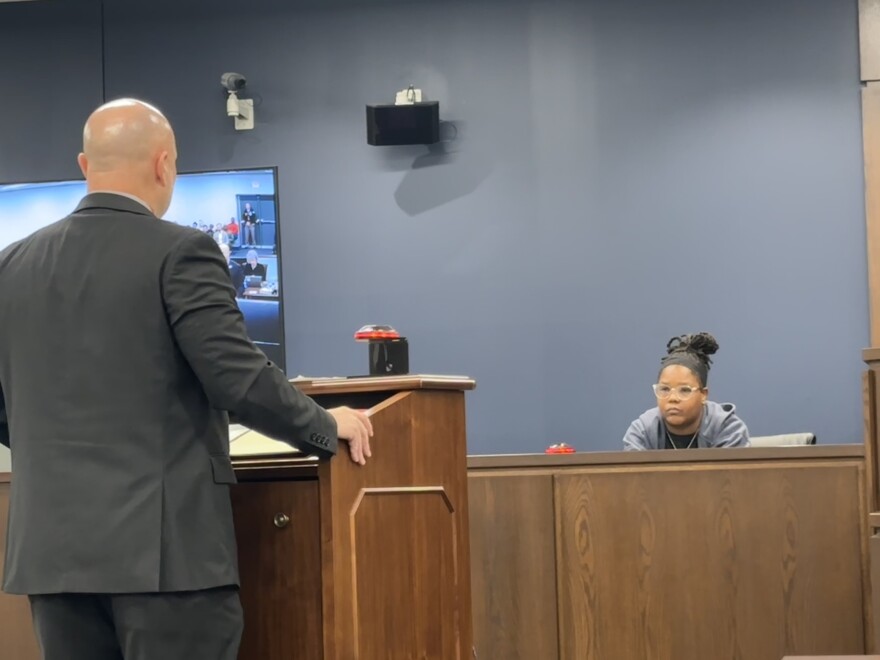
Powell also alleged that she’d been pressured into giving that testimony by Shannon Morgan – her best friend at the time and a romantic partner of Cross at the time of the murder – who threatened her with physical violence. She also alleges multiple male police officers, who she could not identify, threatened to have her parents sent to jail on drug charges and to have her put in prison and have her daughter – who she was pregnant with at the time – taken away from her. She said multiple officers also instructed her on how to testify against Cross over the course of several interviews.
Under threat of perjury charges, Powell told the court that she decided to come forward after speaking with an investigator working for Cross’s defense team in October. Powell said she felt “really awful” about her testimony in 2008 when she’d been “told to lie” and wanted to set things right by helping the team fighting for Cross.
“I don’t think an innocent man should be in jail,” she said.
Tamara Caldwell also said that she was coerced by members of law enforcement, specifically identifying the same KBI agents Stubblefield did the day prior – Wise and O’Neil.
Caldwell said she was treated “like trash” and claimed she was inappropriately touched by O’Neil during interrogations. She said the pair of agents threatened her to tell a version of “the truth” that implicated Cross in Currin’s murder.
“They started interrogating me, telling me if I didn't tell the truth, that I was gonna be shipped down the river and I was gonna get the electric chair and I would never go see my kids again,” Caldwell said.
The testimony of Victoria Caldwell, another major witness in the 2008 case, was delayed several hours after she claimed to have suffered a mini-stroke earlier this week. She invoked her Fifth Amendment rights to nearly every question she was asked before being dismissed by the judge.
New witness links case to early suspect
The court also heard from Darryl Montgomery, who hasn’t taken the stand in any court proceedings related to Currin’s murder prior to Wednesday. He testified that he’d heard Jeremy Adams – an early suspect in the case – confess to the crime in 2000 just months after it was committed.
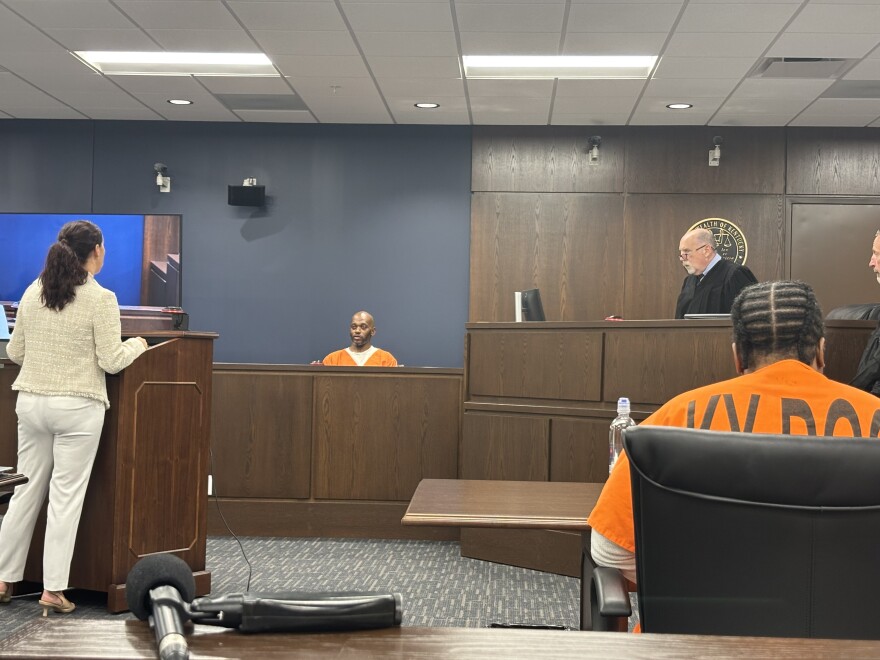
Montgomery and Adams were both incarcerated in McCracken County at the time. Montgomery claimed Adams was talking loudly in the prison dorm they shared about how he’d killed his “baby mama” and that she’d been burned and strangled in Mayfield. Years later, when he was out of prison, Montgomery got into a relationship with a woman with close ties to the Currin family, learned about Currin’s death and put together the pieces.
Around 2012, Montgomery – incarcerated again – met Quincy Cross in Northpoint Training Center, a prison complex in Burgin, where he overheard him talking about being in prison for a crime he didn’t commit. Montgomery said it all clicked for him then.
“I walked over, basically being nosey, and when I asked him what had happened … [After Cross explained] I was like, ‘No,’ I said, ‘Jeremy Adams done that. He told me in jail.’”
State calls law enforcement, other witnesses
When defense witnesses were unavailable, Gill allowed the state to call multiple witnesses up for testimony, including former Kentucky State Police officers Michelle Kent and Sam Steger, as well as Latoya Senter – whose house Currin had played cards at on the night she disappeared.
Both Kent and Steger denied threatening witnesses or telling them how to testify. Multiple witnesses said that they saw officers start and stop recording devices during interrogations, and that they would threaten them or instruct them on what to say during these gaps. Steger and Kent both also denied doing this.
In 2008, Senter had testified that Stubblefield left her house in a car the night Currin disappeared. But Wednesday, she too recanted her testimony at the risk of perjury charges, saying that Stubblefield never left that night and that she can account for her whereabouts for the evening Currin was believed to have been killed. She testified that KBI officers also threatened her into changing her story.
“The KBI came and interviewed me at my house and they threatened me, coerced me and everything else,” Senter said. “I was pregnant with my daughter and they said I will have my daughter in jail and go to jail for it if I didn’t change my story because Vinisha already confessed to it.”
Assistant Attorney General Barbara Maines Whaley, the lead prosecutor for the state, did not give comment after Wednesday’s events concluded, instead referring requests for comment to state public affairs personnel.
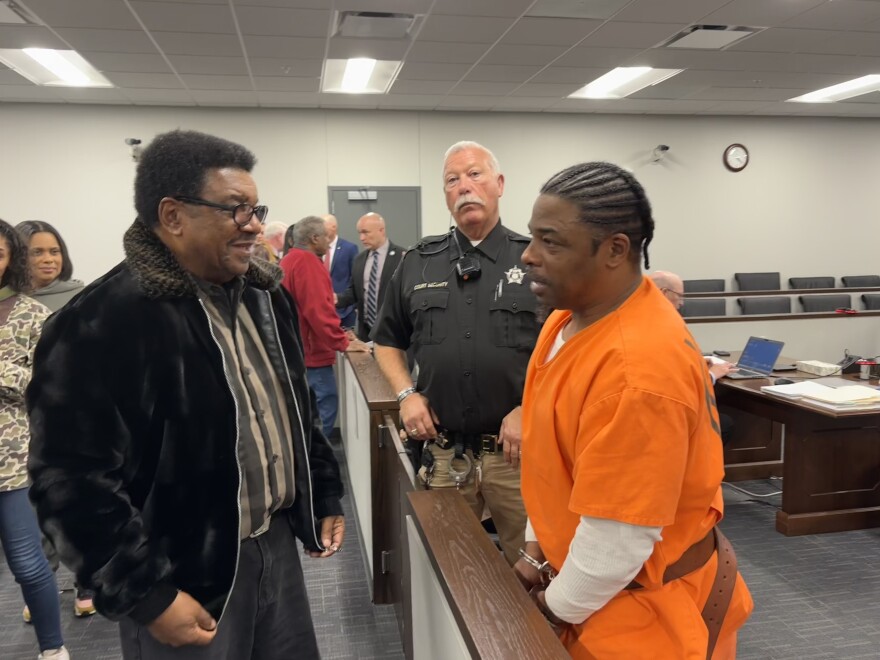
Attorneys with the Kentucky Innocence Project and the Exoneration Project distributed a paper media statement saying they believe the evidence brought forward during this evidentiary hearing will support Cross’s “long-maintained innocence and will warrant a new trial.”
Cross, who watched the October court date remotely via teleconference, joined his defense team in the Mayfield court facility both Tuesday and Wednesday.
The evidentiary hearing will resume on Dec. 18. It’s expected to conclude that day.




